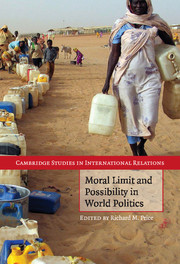Book contents
- Frontmatter
- Contents
- List of contributors
- Preface
- 1 Moral limit and possibility in world politics
- 2 Constructivism and the structure of ethical reasoning
- 3 The role of consequences, comparison and counterfactuals in constructivist ethical thought
- 4 Sovereignty, recognition and indigenous peoples
- 5 Policy hypocrisy or political compromise? Assessing the morality of US policy toward undocumented migrants
- 6 Lie to me: sanctions on Iraq, moral argument and the international politics of hypocrisy
- 7 Paradoxes in humanitarian intervention
- 8 Inevitable inequalities? Approaching gender equality and multiculturalism
- 9 Interstate community-building and the identity/difference predicament
- 10 Progress with a price
- Index
- Cambridge Studies in International Relations
- References
3 - The role of consequences, comparison and counterfactuals in constructivist ethical thought
Published online by Cambridge University Press: 14 May 2010
- Frontmatter
- Contents
- List of contributors
- Preface
- 1 Moral limit and possibility in world politics
- 2 Constructivism and the structure of ethical reasoning
- 3 The role of consequences, comparison and counterfactuals in constructivist ethical thought
- 4 Sovereignty, recognition and indigenous peoples
- 5 Policy hypocrisy or political compromise? Assessing the morality of US policy toward undocumented migrants
- 6 Lie to me: sanctions on Iraq, moral argument and the international politics of hypocrisy
- 7 Paradoxes in humanitarian intervention
- 8 Inevitable inequalities? Approaching gender equality and multiculturalism
- 9 Interstate community-building and the identity/difference predicament
- 10 Progress with a price
- Index
- Cambridge Studies in International Relations
- References
Summary
First let me plead guilty to one of the charges that Price aims at constructivists. Although I believe that some of my work has demonstrated the possibilities of moral change in world politics, I have not explicitly articulated a normative or prescriptive position of particular changes as good. And this is the case despite the fact that my students and my colleagues get irritated when I (not infrequently) bristle with moral indignation. The story of why I and other constructivists have not engaged in normative theory is complicated. I don't claim to fully understand it and I don't want to dwell on it here, but just mention a few possible explanations. When I started working on human rights in the late 1980s, the choice of topic alone was a sufficiently normative signal that I felt obliged to spend the rest of my time demonstrating that I was being rigorous in my theory and method. Perhaps I believed that my normative argument was implicit and the discerning reader would know where I stood. Maybe Frost is correct and even constructivists have concealed our ethical stances under a disguise of (our own kind of) scientific objectivity? After over twenty years of doing serious empirical research to document key trends in world politics, I'm still annoyed at being categorised in a recent article by Jack Snyder and Leslie Vinjamuri among those ‘idealists’ who don't understand the ‘political realities’ of world politics.
- Type
- Chapter
- Information
- Moral Limit and Possibility in World Politics , pp. 83 - 111Publisher: Cambridge University PressPrint publication year: 2008
References
- 9
- Cited by



